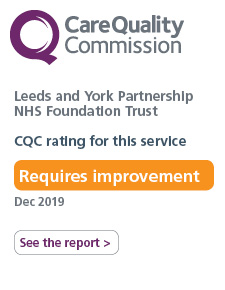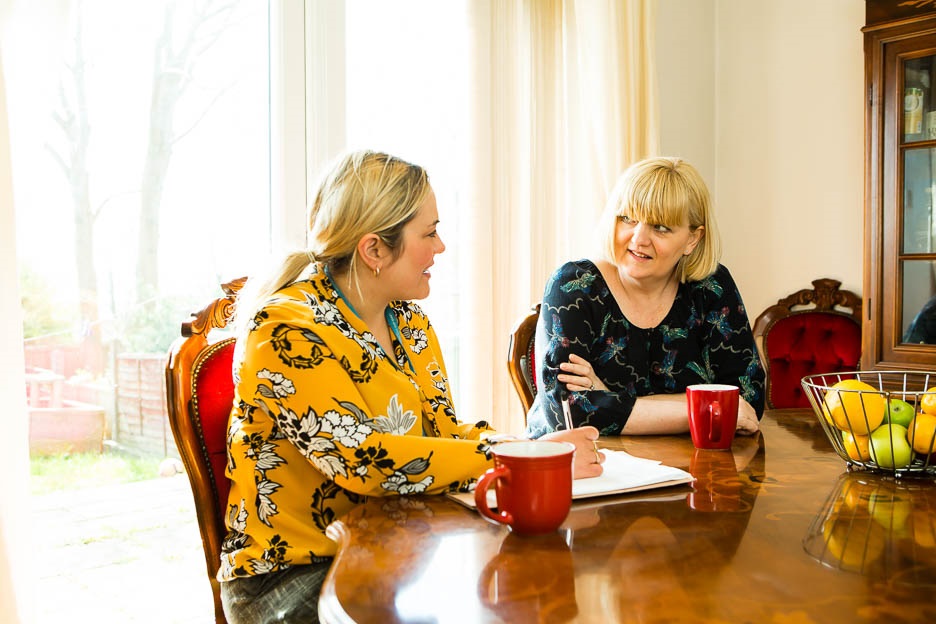Older People’s Community Mental Health Services
Changes to Older People’s Community Mental Health Services and Memory Assessment Service during the Coronavirus pandemic.
During the Coronavirus pandemic we have had to change the way we provided support to you, in order to keep you and our members of staff safe. This has meant limiting the amount of people we see face-to-face, and some of our services unfortunately being paused.
We want to update you on our current situation and what to expect.
How will I receive my care?
Remote contact
For the time being, the majority of your contact will be offered by digital methods where possible. This includes telephone, video consultations, and possibly text messaging and email.
If you are given an individual member of staff’s work phone number or email address, the appropriate use of this will be discussed with you.
Face-to-face contact
We will still see people face-to-face where that is needed. This will include when we need to do memory tests that can’t be done remotely. Many people may receive a mixture of different contact types.
Keeping us all safe
If you are seen face-to-face, our staff must wear Personal Protective Equipment (PPE). This could include face mask, apron, gloves and visor / goggles.
You should also wear a face covering unless you are exempt. A face covering should cover your mouth and nose while allowing you to breathe comfortably.
Alternative locations
We are unable to see people in some of our buildings at present, and when they do re-open, spaces will be very limited in order to maintain safety in our clinical areas.
If you need a face-to-face appointment but this cannot be done at your home or in an outdoor space, you may be asked to travel to an alternative Trust location to be seen.
What if telephone / video isn’t suitable for me?
You will not be disadvantaged
We recognise that digital doesn’t suit everybody. You may not have the equipment, know how to use it, have private space, or other things that make it difficult for you.
You have a choice
The team should discuss your preferences with you, and agree how you will communicate and receive your care. This can change and be reviewed as part of your care plan.
We can help
We will try to support you in overcoming some of these barriers where we can, so you can receive the same care by video consultation. This can be done on a computer, smartphone or tablet. We can offer advice and help to get set up online.
Why aren’t things returning to how they were?
Limiting the spread of the virus
We have to take a cautious approach and continue to limit our face-to-face contacts as much as possible to avoid further spread of the virus. This is to keep you, your families, and our staff safe.
Clinic space
We cannot run things such as outpatient clinics as we used to due to the limited space in our buildings. Using digital technologies allows us to still offer those services just in other ways.
Impact of PPE
We know it can be difficult communicating and building a relationship with staff in masks. A video consultation can sometimes be better than a face-to-face appointment in this case, so you can see the professional’s face whilst talking to them.
Benefits
Many people have found benefits to video and telephone consultations. This includes reduced travel, reduced costs, increased flexibility and more. For this reason it is something we want to continue to offer moving forwards.
We thank you for your patience and understanding
Feedback
We’re keen to hear about your thoughts and experiences of your care over recent months.
If you have received a survey please consider sparing a few minutes to complete it and send it back to us in the prepaid envelope provided.
Alternatively, you can complete our feedback survey online:
www.smartsurvey.co.uk/s/SUFeedbackOPS
or scan the QR code with your smartphone camera.

About the service
Our Older People’s Community Mental Health Service is a dedicated service for people aged 65 and over living in Leeds. We also run services for adults aged 18 to 65 years old.
This service consists of three teams operating across Leeds offering home-based care to older people experiencing complex, severe and enduring mental health problems including mood disorders, psychosis and dementia.
It also hosts our Memory Assessment Service which provides assessment, diagnosis and treatment for people  diagnosed with dementia and mild cognitive impairment – when a person has trouble remembering, learning new things, concentrating, or making decisions that affect their everyday life.
diagnosed with dementia and mild cognitive impairment – when a person has trouble remembering, learning new things, concentrating, or making decisions that affect their everyday life.
The service consists of many different professionals who work together to provide specialist community-focused mental health services to older adults. Normally we consider those routinely over 65 years of age but this can vary depending on individual need. Also many people aged 65 and over do not consider themselves to be “old” and may have active work and social lives.
Our Vision
We work together with service users, carers and families help them reach their potential, and we support people to enjoy a valued, satisfying and meaningful life.
The aims of our service are:
- To offer a full professional assessment of people’s mental health needs
- To work with service users and carers to provide a detailed care plan and crisis plan
- To see or have contact with service users within 15 days of referral for assessment
- To provide a service for people with complex mental health needs, who can be safely supported in the community using the Care Programme Approach (CPA)
- To ensure services are accessible to all sections of the Leeds population within each locality, in line with our principles of equality and diversity
- To provide a joined up approach to care, working with other mental health, physical health and social care services across Leeds
What to expect
 We aim to see or have contact with service users within 15 days of referral for an assessment. This could take place in your own home, a clinic setting, a care home or a community venue if appropriate.
We aim to see or have contact with service users within 15 days of referral for an assessment. This could take place in your own home, a clinic setting, a care home or a community venue if appropriate.
Members of our team will speak to service users and their carer(s) to better understand:
- What’s causing the current distress, what’s triggering it and what’s making it worse?
- What strengths a service user has, and what resources they have around them that could help?
We also look at physical health needs and we may ask other colleagues to support with any needs here. Once we’ve done an assessment, we use a technique called formulation to work out a care plan.
Formulation
Formulation of the service user experience is used to guide the treatment offered by the community mental health service. Formulation is a word we use to describe the bringing together of information gathered during an assessment. It is a series of ideas we might have to describe and understand a service user’s experience.
The formulation will be created and shared with service users (and carers if appropriate) as standard, and will be accessible, easily understood, and be meaningful to the service user.
The formulation will be used to help guide the plan of care and the delivery of any therapies or ‘interventions’ (see below). The formulation will be a working document, with new information included when it is identified.
Interventions and therapies
The following is a brief overview of the kinds of things we might do to help.
- A review of your prescriptions and medicines
- Provide a period of psychological therapy – including cognitive behavioural therapy for example
- Recommend getting involved in psychological therapy groups
- A range of specialist occupational therapy interventions – including improving functional ability and social participation
- Support with your diet and nutrition
- Physical health support including treating any immediate physical health risks
- Advice on support to improve lifestyle such as physical and social activity
Dementia-related interventions
Following diagnosis and any brief post diagnostic support by a local Memory Assessment Service (MAS), people will be offered referral on to the community mental health team for support with dementia-related problems. This includes a range of interventions working with people with mild, moderate and severe dementia.
Referrals
This section is for health and care professionals looking to make a referral into our Older People’s Community Mental Health Service.
All referrals should be made through our Single Point of Access (SPA).
We will accept referrals for:
- All adults aged 65 years and over irrespective of gender, ethnicity, sexuality, culture or physical abilities.
- People who have substantial and complex mental health needs which cannot be met within Primary Care, IAPT Services or other Community services.
The CMHT will accept referrals for service users with substantial and complex mental health needs which may include:
- People over the age of 65 years with mental disorder and physical illness or frailty that contributes to, or complicates the management of their mental illness.
- Significant cognitive, emotional and behavioural problems associated with a mental health diagnosis.
- People over the age of 65 years with a primary dementia
- People with psychological or social difficulties related to the ageing process, or end-of-life issues, or who feel their needs may be best met by a service for older people.
- Co-morbid mental illness in service users with a neurodevelopmental disorder for treatment of the mental disorder where this is the primary issue.
- Complex presentations associated with severe mental illness, which impacts a significant risk of self-harm, harm to others, risk of harm from others or serious self-neglect.
- People under 65 who have complex physical comorbidities and are best placed with a mental health team with expertise in older peoples’ needs and agreed locally on a case by case/ individual need basis.
Access to service for known service users and carers:
Service users who are known to the CMHTs and have had interventions previously will be triaged following the guidelines above to gain understanding of current reason for referral and any significant changes to presentation. Following discussion with the MDT, consideration should then be given to either offer a review assessment, allocate to care co-ordination or signpost to an alternative service.
What does the service look like?
The Older People’s Community Mental Health Service comprises of three teams which cover three areas across Leeds (see How to Contact the Service below). It also hosts the Memory Assessment Service.
This service operates from 9am to 5pm, Monday to Friday, excluding bank holidays. We work closely with the Older People’s Intensive Home Treatment Team (IHTT), Inpatient Services (Mental and Physical Health) and wider community neighbourhood teams and primary care (including GPs) in delivering a needs-led service.
Outside of our normal hours, services are provided by people’s GPs unless they have been referred to the Intensive Home Treatment Team, or alternative arrangements have been put in place.
Advice and support
If a health professional has given you a specific phone number to call when you are concerned about your condition or that of a loved one, please continue to use that number.
We recommend the following places where you can find helpful and reliable information with links to further help and support.
MindWell website
MindWell is the single ‘go to’ website for information about mental health in Leeds. It includes advice on practical help with things like housing, benefits or money problems.
The National NHS website
The national NHS website (formerly known as NHS Choices) is the official website of the National Health Service in England. It provides a comprehensive health information service helping you to make the best choices about your health and lifestyle, but also about making the most of NHS and social care services in England.
For less urgent health needs, you should contact your GP or a local pharmacist in the usual way. For immediate, life-threatening emergencies, always call 999.
Please note this is not comprehensive list of services but a few suggestions of how to get started finding help and information.
How to contact the service
Our Older People’s Community Mental Health Service is based across three locality areas. Each locality has a dedicated Older People’s Community Mental Health Team and a Memory Assessment Service base.
Teams covering South, Southeast Leeds are based at:
Aire Court Community Unit
Lingwell Grove
Middleton
Leeds
LS10 4BS
Tel: 0113 8550673
Teams covering East Northeast Leeds are based at:
North Wing
St Mary’s House
St Martin’s View
Leeds
LS7 3LA
Tel: 0113 8558877
Teams covering West Leeds are based at:
St Mary’s Hospital
Green Hill Road
Leeds
LS12 3QE
Tel: 0113 8550547
Teams covering North Leeds are based at:
Millfield House
Kirk Lane
Yeadon
Leeds
LS19 7LX
Tel: 0113 85 59350
Page last updated: 31st Mar 2025 2:05pm